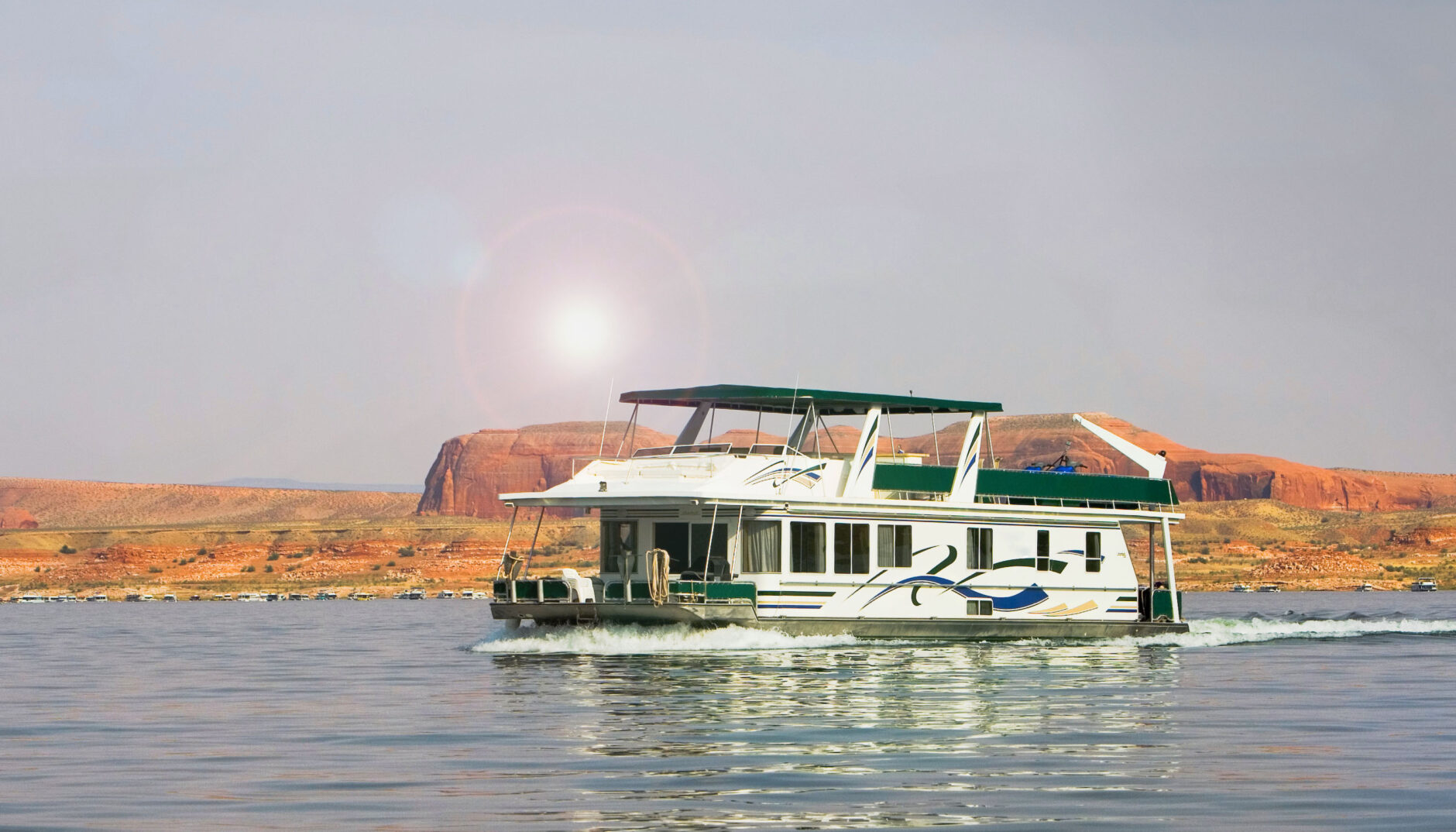For many people who love boats, there’s no better feeling than being on the water. In fact, you might enjoy this feeling so much you could wish you woke up every day in this position. In such a case, you would never need a home on land again; you could simply live on your boat.
For some people, this dream has become a reality; by purchasing a houseboat, they enjoy the best of both worlds — they have a permanent place to live while still being on and close to the water at all times.
Is houseboat living for you? In this article, we’ll dive in and attempt to answer that question using facts and figures, along with some practical advice.

1. How Much Do Most Houseboats Cost?
Although the typical cost of a houseboat is about $50,000, there’s a wide range of designs and features available. While some resemble residences on land, others are unambiguously comprised entirely of commercial watercraft. Many people envision a houseboat as a flat pontoon or barge with walls and a roof attached to it. In some of these cases, these floating homes have a second level or at least an outside deck where residents can take in the surrounding scenery.
Houseboats in the 600-square-foot range can be found for roughly $50,000. However, prices can vary widely; you could be getting a fixer-upper if you pay much less than that. And if you go higher, you risk getting a boat that’s past its prime. Of course, there are other more extravagant choices for the wealthy houseboat buyer that can cost half a million dollars or more.
2. What Features Should You Look for in a Houseboat?
When researching houseboats, your lifestyle is the most important factor. To what extent do you need space? How many pets do you own? How do you feel about early morning jogging? Do you like preparing meals for others? Do you prefer fishing, spearfishing, cruising or water sports? Everything you do every day, including all of the above activities and preferences, needs to be taken into account.
3. Can a Houseboat Be Financed?
The answer to this question lies in the context. The short answer is “yes” if you’re wondering whether you can get a loan to pay for your houseboat. However, you should realize that a houseboat is not the same thing as a floating house. Like a barge at a dock, a floating house is secured to the water’s surface. A floating house might indeed qualify for a mortgage. A houseboat, however, is powered and can travel on its own. In the eyes of lenders, houseboats are more like land-based recreational vehicles (RVs).
You might be able to qualify for an RV loan to pay for your houseboat, but the repayment period will be much shorter than it is with a standard mortgage. However, you may still be able to get loan terms of up to 20 years for a houseboat from some lenders.
4. Should You Get a Used or Brand-New Houseboat?
Your level of mechanical knowledge will usually determine weather you need a new houseboat or a used houseboat. You can save a lot of money by purchasing a previously owned houseboat, provided it has been maintained.
If, on the other hand, you aren’t such a skilled handyman, you may want to spend your extra money on a product covered by a warranty that’s less prone to needing significant maintenance.
5. How Are You Planning to Use Your Houseboat?
The intended purpose of your houseboat is another factor to think about before making a purchase. Is your houseboat going to serve as your primary residence? (This isn’t necessarily the norm for many houseboats.) Or will you solely use it on the weekend? Or will it serve only as an additional activity in conjunction with a yearly trip to a nearby lake?
If your houseboat is also your permanent dwelling, you’ll need to plan for amenities like a kitchen and bathrooms. However, if it’s only for occasional recreational use, you may simply want to focus on making it as enjoyable and relaxing as possible for yourself.
6. Is Houseboat Living More Cost-Effective?
Houseboats are frequently far more cost-effective than conventional homes. Living on board a houseboat can be expected to cost only around $6,000 per year on average. Houseboats provide a low-priced, low-maintenance alternative for retirees, which is why many of them have made the choice to live this way.
7. Is a Houseboat Subject to Taxes?
Houseboats are often exempt from property taxes since they’re not considered “permanent” structures. At the same time, houseboats have the following fixed costs:
- Sales tax
- Insurance
- Dock or slip rental fees
8. What are the Economic Pros and Cons of Houseboat Ownership?
Houseboat living does have several economic benefits, such as:
- No real estate taxes
- In most cases, less money spent on repairs than normal houses
- Possible tax exemptions for floating houses
- No need to worry about yard work or landscaping costs
But bear in mind that houseboat living also has a number of financial costs, including:
- Regularly scheduled sewage pumping
- Repair costs for the houseboat’s motor and other components
- Fuel costs
- Expenses associated with a dock or marina
9. Do Houseboats Lose Value Over Time?
Many houseboats lose value over time, just like any other asset. However, with proper care and maintenance, your houseboat’s value can remain quite stable. Some houseboat models have stood the test of time better than others and have actually appreciated in price.
10. Is It Possible to Spend an Entire Year on a Houseboat?
Under the right circumstances, a houseboat can be suitable for year-round habitation. You’ll need to make some adjustments to your lifestyle if you want to spend the winter months in a region where the water freezes. However, this doesn’t stop you from moving your houseboat to other locations for some parts of the year.
11. What’s the Cost of Docking a Houseboat?
The monthly cost of mooring or docking a houseboat can range from zero to several thousand dollars. Houseboats can often be moored legally in public waterways around the country. Properly docking your houseboat will ensure that it’s securely fastened to the shore so you can quickly and easily access it. Like any other landlord, dock owners typically collect rent from their tenants. Fortunately, however, dock rentals are usually significantly less costly than apartment rents.
Dock rentals can be priced anywhere from a few hundred to over a thousand dollars monthly. There should be a plug at the dock, so you can charge your houseboat’s batteries without having to use your motor. Generally speaking, you’ll have to shell out extra cash for water and power on top of any dock rental fees.
12. How Fast Can a Houseboat Go?
No one expects a houseboat to be a race car. However, there are certain houseboats that are simply modified yachts, and these vessels can reach speeds of up to 40 miles per hour. If you opt for a houseboat that’s essentially a house resting on a pontoon-style raft, you can expect the boat’s peak speed to be quite low — maybe only a few knots or mph. Just the same, if you’re thinking about purchasing a houseboat, speed likely won’t be your top priority.
13. Where Do You Use the Restroom on a Houseboat?
One of the questions about living on a houseboat is how to use the restroom. It’s only one of a number of things you should think about.
To properly answer this question, yes, houseboats do usually have conventional restrooms. A restroom on a houseboat may seem identical to a standard bathroom in an apartment. The plumbing is where you’ll notice a change. When you flush the toilet in a conventional apartment, the waste is carried away to the municipal sewage system or a massive underground tank. A smaller tank is used to hold sewage on a houseboat. Therefore, you’ll need to schedule regular sewage tank cleanings if you own a houseboat.
Most areas with access to the water have businesses that provide septic or sewage tank draining, so finding one to service your houseboat shouldn’t be difficult. Your houseboat’s sewage tanks will typically need to be emptied at least once per month, but they might be able to be serviced less often if you only use your houseboat occasionally.
14. Can Pets Live With You on a Houseboat?
Houseboats may not be the best environment for pets, but there are always exceptions. You shouldn’t bring a pet along if your boat is going to be moored in a location that’s completely surrounded by water. The situation can be different, however, if your houseboat is docked at a marina. Dogs, in particular, require regular exercise, so keep that in mind, even if you keep your houseboat at a port.
15. Do Houseboats Have Much Real-World Value?
In a word, yes! Buying a houseboat can provide a unique way of life that appeals to those who value proximity to the water and the outdoors — the good life on the sea. In addition, neighborhoods of houseboats are often touted for their warmth, welcoming outlook, and strong feelings of community. If you appreciate such things, houseboat life could be perfect for you.
Being totally honest with yourself is the first step. Consider the perks of land life and whether or not you think you could replicate them aboard a houseboat. If the answer is yes, that can be an excellent starting point.
Conclusion
The above questions should help you determine if you want to live your life on the water and sail the seven seas or if you’d rather stay on solid ground. If you enjoy being on a boat and the freedoms that come with it, you may very well want to take the next step toward houseboat living!
Read related articles:




